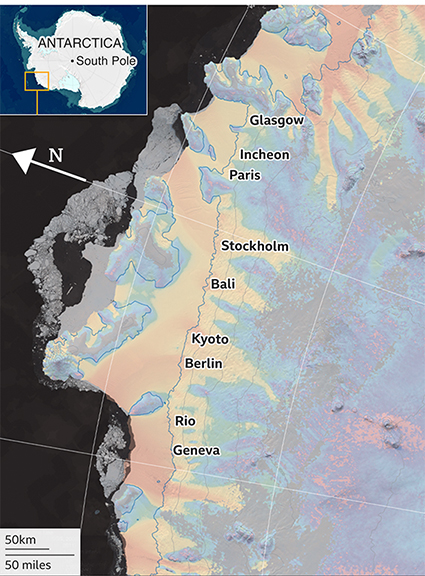Biodiversity & Environment
Glasgow Glacier: Antarctica
- 01 Nov 2021
- 3 min read
Why in News
Recently, the 100-km long body of ice in Antarctica, which has been experiencing rapid melting, was formally named Glasgow after the Glasgow climate summit.
- The 26th session of the Conference of the Parties (COP 26) to the United Nations Framework Convention on Climate Change (UNFCCC) is being held in Glasgow, UK.
Key Points
- Research: Scientists from the University of Leeds in England have studied a chain of glaciers in the Getz basin of Antarctica.
- 14 glaciers in the Getz Basin of West Antarctica are thinning by an average of 25% between 1994 and 2018 due to climate change. The 315 gigatonnes of ice were lost from the region in the last 25 years and contributing to rising global sea levels.
- The Getz basin is part of Antarctica's largest ice shelf. The shelf is subject to more changeable oceanic forcing - a process where relatively warm deep ocean water melts the glaciers from below - than other Antarctic shelves.
- Other Glaciers Named: The eight newly named glaciers are based on:
- Stockholm Conference (1972): One of the major results of the Stockholm conference was the creation of the United Nations Environment Programme (UNEP).
- World Climate Conference, Geneva (1979): The World Climate Conference, now usually referred to as the First World Climate Conference was held in Geneva.
- Rio Summit (1992): It recommended a list of development practices called Agenda 21. It gave the concept of sustainable development to be combined economic growth with ecological responsibility.
- COP1 (Berlin, Germany, 1995): The first Conference of the Parties to the UN Framework Convention on Climate Change (COP-1) met in Berlin in 1995.
- Kyoto Protocol (1997): In Kyoto, developed countries agreed to a collective target of a 5.2% reduction in greenhouse gas emissions below 1990 levels by between 2008 and 2012.
- COP13 (Bali, Indonesia, 2007): Parties agreed on the Bali Road Map and Bali action plan, which charted the way towards a post-2012 outcome.
- COP21 (Paris, 2015): To keep global temperature well below 2.0C above pre-industrial times and endeavor to limit them even more to 1.5C.
- It requires rich nations to maintain USD 100bn a year funding pledge beyond the year 2020.
- Incheon: The Green Climate Fund (GCF) is based in Incheon, South Korea.
- Significance: Over the past 40 years, satellites have observed huge iceberg calving events, changes in the flow of glaciers and rapidly thinning ice demonstrating the devastating impact of global warming.
- The naming of the glaciers after the locations of major climate treaties, conferences and reports is a great way to celebrate the international collaboration on climate change science and policy over the last 42 years.







